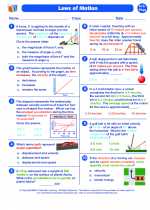Environmental Influence in Physics
Environmental influence in physics refers to the impact that the surrounding environment has on physical phenomena and systems. This includes the influence of factors such as temperature, pressure, humidity, and other external conditions on various physical processes and properties.
Key Concepts
1. Temperature: The temperature of the environment can affect the behavior of materials, gases, and liquids. Understanding the thermal expansion, specific heat capacity, and thermal conductivity of substances is crucial in analyzing their response to temperature variations.
2. Pressure: Changes in pressure can significantly alter the behavior of gases and fluids. Concepts such as Boyle's law and Charles's law are essential in understanding the influence of pressure on the volume and temperature of gases.
3. Humidity: The presence of water vapor in the air can impact various physical processes, including the evaporation and condensation of liquids, as well as the behavior of materials such as hygroscopic substances.
Study Guide
When studying environmental influence in physics, consider the following key topics:
- Thermal Expansion: Understand how different materials expand or contract with changes in temperature, and how this phenomenon is utilized in applications such as thermostats and bimetallic strips.
- Specific Heat Capacity: Learn how the amount of heat required to raise the temperature of a substance is related to its specific heat capacity, and how this property affects the transfer of thermal energy.
- Boyle's Law and Charles's Law: Explore the relationships between the pressure, volume, and temperature of gases, and how changes in these parameters affect the behavior of gases under varying environmental conditions.
- Evaporation and Condensation: Investigate the influence of humidity on the phase transitions of substances, and how the rate of evaporation and condensation is affected by environmental factors.
By mastering these concepts and their applications, you can gain a comprehensive understanding of how environmental factors influence physical phenomena and systems in the field of physics.
.◂Physics Worksheets and Study Guides High School. Laws of Motion - Set I

 Worksheet/Answer key
Worksheet/Answer key
 Worksheet/Answer key
Worksheet/Answer key
 Worksheet/Answer key
Worksheet/Answer key
